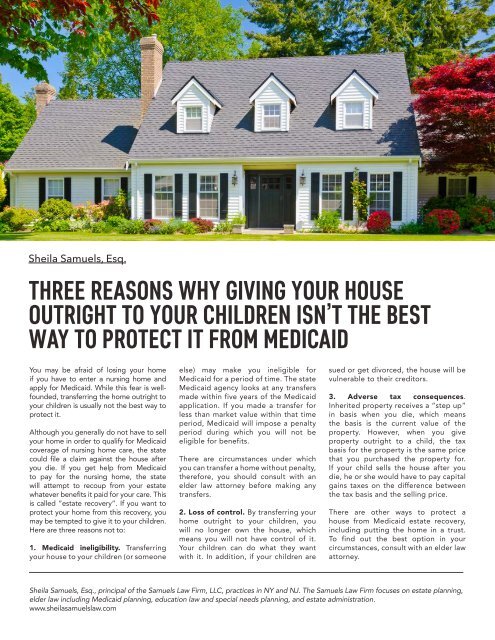24 Seven March 2018
Change Your Attitude… Change Your Life: 24/seven is a monthly, free magazine for personal growth, professional development, and self-empowerment. The approach is holistic, incorporating mind, body, soul, and spirit. As philosopher Francis Bacon said, “Knowledge is power.” Use this information to live your best life now.
Change Your Attitude… Change Your Life: 24/seven is a monthly, free magazine for personal growth, professional development, and self-empowerment. The approach is holistic, incorporating mind, body, soul, and spirit. As philosopher Francis Bacon said, “Knowledge is power.” Use this information to live your best life now.
You also want an ePaper? Increase the reach of your titles
YUMPU automatically turns print PDFs into web optimized ePapers that Google loves.
Sheila Samuels, Esq.<br />
THREE REASONS WHY GIVING YOUR HOUSE<br />
OUTRIGHT TO YOUR CHILDREN ISN’T THE BEST<br />
WAY TO PROTECT IT FROM MEDICAID<br />
You may be afraid of losing your home<br />
if you have to enter a nursing home and<br />
apply for Medicaid. While this fear is wellfounded,<br />
transferring the home outright to<br />
your children is usually not the best way to<br />
protect it.<br />
Although you generally do not have to sell<br />
your home in order to qualify for Medicaid<br />
coverage of nursing home care, the state<br />
could file a claim against the house after<br />
you die. If you get help from Medicaid<br />
to pay for the nursing home, the state<br />
will attempt to recoup from your estate<br />
whatever benefits it paid for your care. This<br />
is called “estate recovery”. If you want to<br />
protect your home from this recovery, you<br />
may be tempted to give it to your children.<br />
Here are three reasons not to:<br />
1. Medicaid ineligibility. Transferring<br />
your house to your children (or someone<br />
else) may make you ineligible for<br />
Medicaid for a period of time. The state<br />
Medicaid agency looks at any transfers<br />
made within five years of the Medicaid<br />
application. If you made a transfer for<br />
less than market value within that time<br />
period, Medicaid will impose a penalty<br />
period during which you will not be<br />
eligible for benefits.<br />
There are circumstances under which<br />
you can transfer a home without penalty,<br />
therefore, you should consult with an<br />
elder law attorney before making any<br />
transfers.<br />
2. Loss of control. By transferring your<br />
home outright to your children, you<br />
will no longer own the house, which<br />
means you will not have control of it.<br />
Your children can do what they want<br />
with it. In addition, if your children are<br />
sued or get divorced, the house will be<br />
vulnerable to their creditors.<br />
3. Adverse tax consequences.<br />
Inherited property receives a “step up”<br />
in basis when you die, which means<br />
the basis is the current value of the<br />
property. However, when you give<br />
property outright to a child, the tax<br />
basis for the property is the same price<br />
that you purchased the property for.<br />
If your child sells the house after you<br />
die, he or she would have to pay capital<br />
gains taxes on the difference between<br />
the tax basis and the selling price.<br />
There are other ways to protect a<br />
house from Medicaid estate recovery,<br />
including putting the home in a trust.<br />
To find out the best option in your<br />
circumstances, consult with an elder law<br />
attorney.<br />
Sheila Samuels, Esq., principal of the Samuels Law Firm, LLC, practices in NY and NJ. The Samuels Law Firm focuses on estate planning,<br />
elder law including Medicaid planning, education law and special needs planning, and estate administration.<br />
www.sheilasamuelslaw.com


















